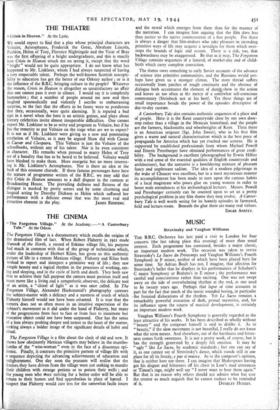Stravinsky and Vaughan Williams
MUSIC
THE B.B.C. Orchestra has just paid a visit to London for four concerts (the last taking place this evening) of more than usual interest. Each programme has contained, besides a major classic, an important modern work. The occasion was taken to revive Stravinsky's Le Sacre du Printemps and Vaughan Williams's Fourth Symphony in F minor, neither of which have been played here for some time. Sir Adrian Boult has not, I imagine, that affection for Stravinsky's ballet that he displays in his performances of Schubert's C major Symphony or Brahms's in E minor ; the performance was careful and conscientious rather than exciting. One was not swept away on the tide of overwhelming rhythm at the end, as one used to be twenty years ago. Perhaps that lapse of time accounts in part for the fact that much of the music sounded boring, in particular • the frenzied dislocations of the rhythm. Yet Le Sacre remains a remarkably powerful evocation of dark, primal mysteries, and, for its influence upon the course of musical development, is certainly an important modern work.
Vaughan Williams's Fourth Symphony is generally regarded as the least attractive of his works. It has been described as wholly without " beauty " and the composer himself is said to dislike it. As to " beauty," if the slow movement is not beautiful, I really do not know what the term means. And elsewhere, out of the harshness and bitter- ness comes forth sweetness. It is not a pretty work, of course, but it has the strength generated by a deeply felt emotion. It may be " ugly " like Le Sacre, by academic standards ; but one can say of it, as one cannot say of Stravinsky's dance, which stands still in one place for all its frenzy, e pur si muove. As to the composer's opinion, that is neither here nor there. I can imagine that Shakespeare having got his disgust and bitterness off his chest in Lear's mad utterances or Timon's rage, might well say " I never want to hear them again." But that is no reason why others should not admire what has cost the creator so much anguish that he cannot endure to be reminded


























 Previous page
Previous page